#short story review
Text
Solarpunk-Review: Soylent Green is People! by Carlos Orsi

Preface:
I asked a couple of months ago, whether people would be interested to read reviews of different Solarpunk shortstories, given that I have collected quite a few Solarpunk anthologies. And several people said, they were. (Shoutout to @solarpunkpresentspodcast!) Hence I am going to start posting a review once or twice a week now.
I will start by reviewing the stories from Solarpunk: Ecological and Fantastical Stories in a Sustainable world, given that this anthology is very much part of the beginning of Solarpunk as a genre. Though this means too, that certain ideas of Solarpunk might not be quite as thought through yet.
Summary
The nameless protagonist is a private detective. When a well-known and rich engineer dies by suicide and his mother disappears, several people want to either see the mother found or the death confirmed. After all, there is a considerable heritage to speak about. A heritage that both the engineer's girlfriend, and the mother's church want to lay claim to.
General Review
As it is so often with detective stories that hinge on a big mystery, it is quite hard to review this story, without going too far into spoiler territory. And given this story relies on the central mystery to keep you going (especially as it is fairly long for a short story), I will not spoil it.
It was kinda funny how this story very much did feel like a noir story, though I might note that I really could have done without the attractiveness of female characters being a topic that somehow had to be brought up against and again throughout this story. And while the female characters were not exactly sexualized, with each of them (even the missing 90yo mother) attractiveness was a thing that was brought out.
The mystery itself worked really good though. I was invested in it and the final twist was a good one, that I quite enjoyed. Now, I could point out one major plothole in there - but it is not one that I can talk about without spoiling the story. So just know: Something about the end of the story leaves open a big plothole that to me was not properly answered.
The Solarpunk Factor
Let me talk about the aspect, that I want to bring up in all of these reviews: How Solarpunk is this story?
And honestly, to me the point where it lost me in this regard is the very beginning, where the story brings up that the missing mother was disabled, and it goes: "Could you believe that? She totally chose to be disabled!!!" Because we quickly learn, that basically in this world nobody really is disabled, given that with cybertech and genetech most disabilities have been healed. And while the story at times feels at least somewhat critical of this societal pressure to get yourself cured - and also have your looks changed through genetech - it was this fact that really did not make this story feel Solarpunk to me.
Honestly, in general I got to say that for several reasons (some of which again are very essential to the reveal, hence I will not spoil them) this story felt as if it was set more in a very eco-friendly biopunk world, rather than anything I would consider actually Solarpunk. Partly, too, because we also quickly learn that this world is definitely one of capitalism still.
#solarpunk#solarpunk review#short stories#short story review#anthology#science fiction#biopunk#cyberpunk
16 notes
·
View notes
Text
Short Story Saturday: Hyperthief: A Tale of the Cytoverse
Authors: Brandon Sanderson and Janci PattersonPublisher: Dragonsteel EntertainmentReleased: November 21, 2023Received: OwnFind it on Goodreads
Oh! Yet another (mini) story set in the Cytoverse universe? Yes, please! That said, Hyperthief is by far the shortest of the bunch, coming in at a grand total of 18 pages. It’s short and sweet, focusing primarily on FM’s birthday. Not that I’m…

View On WordPress
#Book#Book Review#Books#Brandon Sanderson#Brandon Sanderson and Janci Patterson#Cytoverse#Dragonsteel Entertainment#Fiction#Hyperthief: A Tale of the Cytoverse#Janci Patterson#Literary#Literature#randon Sanderson#Review#Science Fiction#short#Short stories#Short story#Short story review
2 notes
·
View notes
Text
The Touch of the Sea reviews
My roommate snagged me a short story anthology that she called "A collection of gay mermaid erotica." Say no more. Turns out most the stories were NOT erotic (most made some reference to sex but some were only a few lines or fade to black) but there was plenty else to enjoy in this anthology edited by Steve Berman. Individual story thoughts below the read more.
Time and Tide by 'Nathan Burgoine
A man returns to his hometown for his father's funeral, and has to confront his ex he left behind when he originally left and his own heritage/powers. This one was super sweet, I found it nicely grounded and healing in a "returning to the hometown and finding peace" way. The ending brought a little tear to my eye. The powers/gifts were somewhat underexplored, but that makes sense for a short story.
The Calm Tonight by Matthew A. Merendo
Sea men go up to land every 200 years to choose a mate, and always bring back a woman who magically is able to live underwater with them thanks to magic. Our main character, however, falls in love with a man, and is hesitant because the magic may not protect his love the same way, and so he must choose between the sea and his love. Made me somewhat sad, but I'm staying hopeful despite all the evidence otherwise. I choose to believe they got their happy ending.
The Bloated Woman by Jonathan Harper
Not a fan. A man stays by the shore to help take care of his aging professor, has a tryst with a married man, and runs into a random woman's body on the beach. Just kind of felt like "Ooh sad/brutal things happen". The narrator also spoke about others in a mean way sometimes that I'm not sure if it was intentional characterization or just the author kind of being a dick. The mystery aspect was intriguing but didn't really have a satisfying payoff for me.
The Stone of Sacrifice by Jeff Mann
This was a breath of fresh air, especially the first half where a man just finds this random cute guy swimming in the middle of a storm. I will say the Scottish accent of the sea-guy was something I'm not used to reading and it made for a bit of a silly contrast for me during the heavier erotic sections... but I was delighted the whole time. The ending got a lil worrisome, but overall I'm a fan.
Air Tears by Damon Shaw
After a kiss, the main character finds himself unable to breath air but able to breath underwater. Short, and I think that fit as the compelling part of it was the snapshot concept of a man underwater, crying tears of air that bubble up to the surface.
The Grief of the Seagulls by Joel Lane
A man recalls how his lover died thanks to corporate greed for oil along the shore. Sad but poignant, the corporate greed destroying safety felt all-too-familiar, but at least in this story there is a little closure given for the grief. A really thoughtful work.
Ban's Dream of the Sea by Alex Jeffers
People who colonized an abandoned island full of architecture have been having sexy dreams and disappearing. I enjoyed the relationship between the two main men in this, the descriptions of architecture (and the use of the tower near the end) I think would appeal to anyone who loves buildings and such but otherwise... the racism I think was intended to be period accurate, but there were various lines about how "savages couldn't have made architecture that advanced/organized/beautiful"... which again we are in the POV of the colonists for that line so it makes sense they say that, but there was so little depth or acknowledgement of the natives culture (or like, what IS the natives architecture then?? If it's not that?) and the randomly tossed in bonds(wo)men just felt like turning a whole group of people into set dressing... It left a bad taste in my mouth that the cool magic concept couldn't quite overpower. Lovecraftian in many ways.
Night of the Sea Beast by Brandon Cracraft
A delightful romp through the making of a monster movie in the McCarthy era with cultural hysteria around homosexuality stoked high... but more importantly, someone or something keeps killing the lead actress of this monster movie. This story was by far the most fun, somewhat silly at times but with a nice core concept and in the spirit of a B-movie horror film. There was also a really strong theme of community, not just among queer folks but also among allies who love them; people continually showed up and helped each other throughout and the very ending scene was so sweet. The exposition was a little heavy-handed at times (everyone's always dropping their relevant backstory notes at the drop of a hat), but I think that's in the nature of the short story (this was among the longer in this anthology, but I would gladly read a longer version with more time spent with the characters and the twists and turns of the mystery).
Wave Boys by Vincent Kovar
This story follows the Wave Boys, a specific sea-faring group among many others that all have their own traditions and cultures. Seeing the Wave Boys traditions, those of other groups, and the larger culture surrounding all of them was interesting and well constructed. Fun with really interesting/engaging cultural worldbuilding, though I got confused at times trying to keep track and figure out what everything was. I especially enjoyed the traditions around storytelling.
Out to Sea by John Howard
One of the more happy stories, where a guy just decides to go and visit some islands he has been interested in for a long time. Didn't particularly stick with me, but was a nice change of pace from some of the sadder/ambiguous stories.
Keep the Aspidochelone Floating by Chaz Brenchley
A vessel gets hijacked by the pirate queen, and a particularly famous sailor decides to join the pirates as a cook. He ends up in a romance with a cute young guy, and there's various shenanigans along the way, including some whaling. If you like Moby Dick then you'll probably enjoy this one. The characters were all strong, especially the pirate queen who I adored. I wish everyone could have had a happy ending, but overall I think the final scene was wonderfully dramatic and full of action and twists. Plus the love interest was adorable.
Overall
I'm not an experienced short story reader, like I don't really do anthologies, so I think it was challenging for me to read stories where there wasn't a lot of time to get into the characters and plots. Plus there were a lot of sad/ambiguous endings, which I generally avoid... but I'm glad I read through and tasted some new things and stuff that's interesting to check out but I might not want a whole book about. My top four were: Night of the Sea Beast, The Stone of Sacrifice, Time and Tide, and Keep the Aspidochelone.
4 notes
·
View notes
Text
youtube
For your viewing pleasure, a short review of my all-time favorite short story ever written.
#ray bradbury#short story#review#book review#short story review#video#video review#sci-fi#the literary lair#literary lair#blackscarabfilmz#Youtube
3 notes
·
View notes
Text
The Short Story Reader #121 - The Last Gamemaster in the World by Angela Liu
Previous | Previous by Angela Liu | Next
What whimsy, I wondered, might Angela Liu have in store for me with this last published piece of hers for the year 2023? Not so much whimsy, it turns out, as an emotionally skewering experience, and, well, I couldn’t be happier. The mysterious figure of the gamemaster invites speculation at the story’s onset: is this one of those science-fictional…
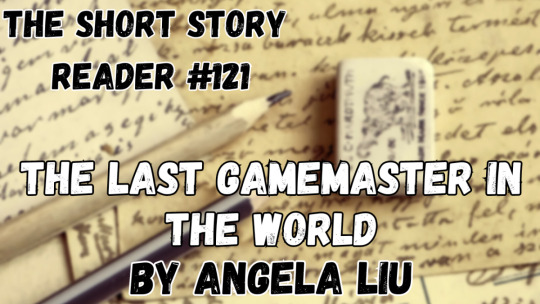
View On WordPress
#Angela Liu#book blog#Clarkesworld#Clarkesworld 207#fiction#literature#Sci-Fi#Science Fiction#short story#short story reader#short story review#The Last Gamemaster#The last gamemaster in the world#Writing
2 notes
·
View notes
Text
Review: The Black Cat
★★★★★ - 5 stars
"For the most wild, yet most homely narrative which I am about to pen, I neither expect nor solicit belief."

One of Poe's most sinister, yet amazing gothic masterpieces: The Black Cat is an introspective and twisted tale of animal cruelty, murder, and domestic violence. It tells the story of a man who grows to resent his pet cat through bitter self-hatred and remorse from his alcohol addiction and soon turns to dark means to rectify the annoyance of the cat's presence. Through the first-person narrative of a man with an addiction to alcohol that is just as strong as his life-long obsession with animals, Poe discusses the grim darkness of humanity caused by our bad habits. He forewarns his readers against drinking alcohol and raises questions of where the line between sanity and insanity lies. Though not extremely graphic, this short piece will have you on edge, disgusted by what you are reading, and simultaneously unable to put it down for a single second. A psychologically uncomfortable and eerie creation, The Black Cat is a perfect short story to curl up with as we check off the days until Halloween.
#the black cat#horror#short story#short story review#edgar allan poe#poe#horror fiction#halloween#spooky#spooktober#halloween reads#october reads#creepy reads#creepy short story#horror short story#animal cruelty#murder#murder story#classic fiction#book review#books#book blog#booklr#readblr#book reccs#book recommendations#bookaddict#bookblr#bookworm#books and reading
6 notes
·
View notes
Text
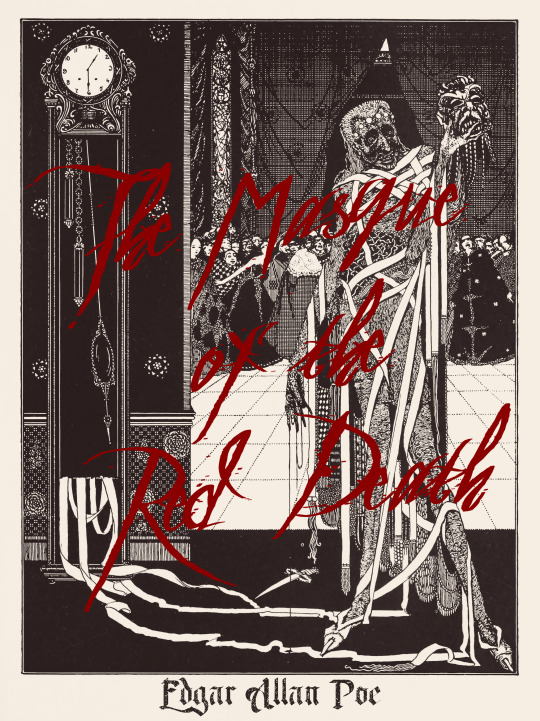
The Masque of the Red Death by Edgar Allan Poe
He had come like a thief in the night.
Poe does a phenomenal job at painting the scene, here. The privileged few attend an extravagant masquerade as the world outside is ravaged by an awful plague. But their ignoring it won’t save them. The form that appears is terrifyingly described, and brilliantly embodies not only the impartial nature of the 'red death', but the unstoppable forward march of time and mortality, itself. It's an astute piece about the nature of not only the wealthy, but mankind in general. And it felt especially timely revisiting it after all the nonsense we've gone through these past few years.
8/10
CLICK HERE to Download/Read The Works of Edgar Allan Poe.
-Timothy Patrick Boyer.
#booklr#horror fiction#edgar allan poe#the masque of the red death#classic literature#short story review#short story#short stories#books#reading#book review#fiction#book reviews#readers of tumblr#horror books#short fiction
2 notes
·
View notes
Text
Review short story "You are my sunshine"

TITTLE: You are My Sunshine
AUTHOR: Octavia Cade
DATE CREATED: 21 Sep 2023
Octavia Cade’s You Are My Sunshine collects eighteen stories that cast a speculative eye on the future, seen through an ecological lens.
Ecological themes carry throughout the book, which also integrates elements of horror. In “We Feed the Bears of Fire and Ice,” which is informed by headlines from science publications, koalas and polar bears contend with climate change; the descriptions of Australia are frightening and dystopian: “Darwin is now called The City of Fire … we who still live and work in Darwin do so underground.” In “Our Flesh Was Bred for This” and “Tranquility,” dead and not-quite-dead bodies are recycled to benefit nature on Earth and on other planets; and in “You Are My Sunshine,” a scientist studying wasting disease in starfish receives a human arm in his mailbox. As more arms arrive, the relationship between them and the starfish’s predicament becomes clearer.
Despite the morbidity of some of the subject matter, the book projects a sense of optimism, rebirth, and improvement throughout. In “The History of a Coral Future,” coral reefs are a metaphor for humanity’s relationship with its own microbiome. The story looks back at a successful realignment of people’s environmental priorities: “They showed us how to change, and so we did.” Elegant, incisive, memorable writing is abundant too: “We had to learn to atone. A mountain has no use for words.”
The characters in these and other stories are unforgettable; the narrator of “Metamorphosis,” for example, explains that she is Gregor Samsa’s sister from Franz Kafka’s story. A contemporary schoolteacher who is preserved from aging, she guides an extended exploration of beetles and cockroaches inspired by her revulsion toward her brother’s transformation years before.
The imaginative stories of You Are My Sunshine combine ecological themes with scientific knowledge to create compelling tales of future possibilities.
2 notes
·
View notes
Text
BOOK REVIEW: TJ Price's The Disappearance of Tom Nero
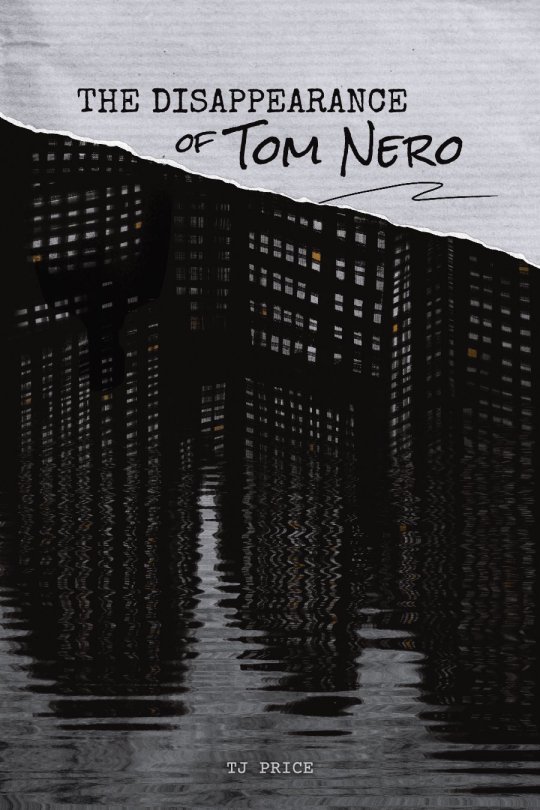
by Elizabeth Broadbent, Staff Writer.
Ideally, your bestie would pass you The Disappearance of Tom Nero in an unmarked paper bag without explanation or elaboration. Spooky House Press must know this: TJ Price’s new novella has no back cover copy. Spoiler-free, here’s what you need to know:
An ambitious interplay between subjectivity and structure, The Disappearance of Tom Nero slides quickly into slow, inevitable dread.
The work’s theme tangles with Alexis Macaluso’s design. It looks great in ebook; it’s fabulous in hard copy. You want this in paperback.
It’s eminently devourable. Tom Nero shouldn’t be likable. You like him anyway, and his voice sticks with you long after you’ve gobbled this up in one sitting (you’ll gobble this up in one sitting.)
Price’s prose propels you through a deft, fast-paced plot you won’t see coming, but which in retrospect seems diabolically inevitable.
I refrained from drawing this review.
Even calling this “metafiction” feels like a spoiler.
I refuse to write any more on your paper bag.
Here’s The Disappearance of Tom Nero. It’s terrifically ambitious. Price pulls it off.
Twitter: @ eerieyore and @ SpookyHousePres
Instagram: @ SpookyHousePress
#review#gothic fiction#fiction#short fiction#gothic literature#book review#horror books#fiction review#horror fiction#horror literature#indie lit#indie literature#indie press#indie horror#short story review#horror novella#small press#novella
2 notes
·
View notes
Text
Reviewing The Ugly Duckling by M. Kuranishi
Westcott Ike reviews The Ugly Duckling by M. Kuranishi
Aiko’s Ratings
Story Rating: 6/10
Character Rating: 8/10
Mood Rating: 6.5/10
Uniqueness Rating: 6.1/10
Overall Rating: 6.7/10
Online Rating: 3 stars
Overall Review
A wholesome modern retelling of an old tale. The story follows Sophia Duckinski, a down on her luck actress who suffered abuse her whole life and, as a result, has ended up lacking self-confidence and self-worth. The encounters…

View On WordPress
#Book Review#book reviews#fairytale#fairytale retelling#fantasy#paranormal romance#review#Reviews#romance#romance book#romance books#romance novel#romantic fantasy#Short Story Review#supernatural
6 notes
·
View notes
Text
I have Strong Opinions about Exhalation by Ted Chiang.
We need to talk about Exhalation, a short story by Ted Chiang, published in an anthology of science fiction short stories of the same name.
We need to talk about it because while not my favourite of his stories so far (that title goes to a very short story called The Great Silence, contained in the same book), I do think it is something we can derive a great amount from it as a piece of fiction.
Spoilers - both for plot and theme.
The very quick summary of the story goes: Society notices a strange occurrence where time seems to be moving faster, until a scientist discovers that instead humanity is perceiving time more slowly and eventually, within the next few centuries perhaps, no human will be able to think at all.
It is however more complex than that.
Exhalation is set in a world with metal walls surrounding it, and what is initially believed to be an infinitely high column of air above. Below the world is a reservoir of high-pressure air that is pumped up and is used to power the machinery that the society uses. Humanity itself is part of that machinery, each person is a robot powered by the movement of air and whose brains function because of that air moving.
Because all technology, and even Humans, are powered by the movement of air, they require the ambient pressure around them to remain lower than the pressure in their own bodies and the machines they use - and as it is used the air is released (exhaled) into the surrounding atmosphere. This isn't a problem until they discover that the sky is not infinite but is sealed and they are in effect in a large chamber where air is slowly accumulating and eventually the pressure will become equal meaning air will stop moving.
It's a metaphor for entropy and the heat death of the universe.
But more interestingly, it is a metaphor for the entropy and heat death of the universe being something caused by anthropological means.
Naturally in our own universe this isn't feasible, the universe is infinitely vast by comparison to our capacity as a species to produce heat. I do however offer an alternative.
It is a metaphor for climate change being the heat death of the world. It isn't an unobvious suggestion, but it's a fascinating one because of its cynicism towards technological salvation and the pursuit of an almost darkly pessimistic outlook on things.
The story ends with the pressure-death of the world, it is ultimately revealed the story itself is a blackbox style record left for explorers from our own reality to recover (this is a recurring trend in Chiang's stories, it seems to be a pet trope of his to reveal at the end of the story, it was being addressed to the reader directly), but immediately before it, after the discovery of this eventual doom there was talk about a great effort being made by certain groups (the technologists) to find a solution using machines, which failed.
Now granted this is realistic, and it drives home the point, but I think it brings up somewhat of a trend in thinking for Chiang, whose writing seems fatally deterministic. This isn't a fault or a criticism, and doesn't challenge the work, but it is of interest to me when reading Exhalation.
It is said in the story that a third of all people simply gave up on trying to find solutions, while another third looked for solutions in technology. The people looking for solutions are dragged out into the spotlight to show their failure, and ultimately it is the people who gave up that are right.
In The Great Silence, a similar conclusion is drawn - that extinction of an entire species is simply inevitable because nothing can be done. That what is framed as genocide is impossible to circumvent and that there is a value to "going out in grace". In The Merchant and the Alchemist's Gate, the main character is forced to simply accept their fate.
The end is pre-determined.
In What's Expected of Us, people have discovered a means to send electrical signals back in time and have used it to create a device which predicts if you will press a button or not. This ends up causing people to realise that free-will is effectively non-existent and that all things are predetermined.
If you're not seeing the trend in Chiang's work, so far from what I have read they're all stories about accepting something bad, because it was destined to happen.
The one to break furthest from the mould so far has been Dacey's Automatic Patent Nanny, a story about the risks of replacing humans with machines, and the need for human interaction in the nurturing process. It is however a story about accepting the status quo because while it was bad, it is destined.
They're stories that at the end of the day are about how liberalism is unwilling to challenge itself in order to avert self-annihilation, or how it can't fathom escaping a cycle of destruction. Everything is pre-determined and thus it must mean that the status quo was itself pre-determined.
Exhalation is not special amongst these, it simply builds a world around that assumption, creating a metaphor for climate change - machines which are killing the planet and life itself - and cannot imagine a way out of it.
It ends not with a message to do something about it, but to remember what you have lost as you allow yourself to die. It asks you to "enjoy what you have while it lasts, because the end is inevitable".
I do not personally think it is a particularly "wonderful parable".
2 notes
·
View notes
Text
Solarpunk Review: When Kingdoms Collide by Telmo Marçal

Preface:
I am continuing with my reviews for the short stories in the book "Solarpunk: Ecological and Fantastical Stories from a Sustainable World". Once again: This book was published in 2012, so it is expected that in many regards it does not mirror modern Solarpunk sentiments.
Summary
The once more unnamed protagonist is working for Brazil's Secret Service. As the "Greenie movement" (a movement in which people let themselves be genetically modified to become capable of photosynthesis) grows stronger within the country and gets the right to live in their own colonies, the protagonist gets sent into one of those colonies, to find out whether something fishy might be going on.
General Review
Honestly: I did not like this story at all. It is paced really weirdly and in general has a structure that does not sit quite right with me. Now, it should be said that I do not know whether the structure employed here is something related to some storytelling devices prevalent in Brazil, but at least to me it just seemed very chaotic.
Like the first story, this one is mostly a mystery story, only that the central mystery is not really clear from the beginning. It is just "something weird is happening there", and that's pretty much it. There is also not much work being put into the main character actually investigating everything. As soon as he comes to the colony he finds out basically within one and a half pages of the story.
It also should be said, that the story really heavily relies on the shock factor of the big reveal - and... I don't know. I might be a bit jaded, given I am reading this in 2024. But... I mostly rolled my eyes at the big reveal. Because to me it felt cheap as hell.
The Solarpunk Factor
Once again, this story does not really feel like Solarpunk to me, but more like Biopunk. This time not even with much of a Solarpunk paintjob. I mean, I guess the folks gene manipulating themselves to live just of water and sunlight are living a bit more sustainable than everyone else, but in general it did not really feel as if this story put much emphasis on any form of sustainability. And of course there is the big reveal in the end, which... also does not really work to read this story as anyway Solarpunk.
The entire "gene manipulation" thing does instead do feel like Biopunk through and through. And the darker twist at the very end also does fit much more into the Biopunk mindset, than it does with Solarpunk.
So, yeah. Not much Solarpunk here.
#solarpunk#solarpunk review#solarpunk writing#short stories#anthology#biopunk#cyberpunk#media review#short story review
10 notes
·
View notes
Text
Short Story Saturday: Swamp Bromeliad by Seanan McGuire
Series: InCryptid #3.4Author: Seanan McGuireReleased: February 18, 2016Rating: 4 kittiesGoodreads | Seanan McGuire’s Patreon
Swamp Bromeliad is another short from the perspective of Verity Price, as she and her partner are making their way back home. It’s set in the larger InCryptid universe after the third novel.
Whenever the family returns to Buckley Township, certain creatures and themes…

View On WordPress
#Book#Book Review#Books#Fiction#InCryptid#InCryptid 3.4#Literary#Literature#Review#Seanan McGuire#short#Short stories#Short story#Short story review#Short Story Saturday#Swamp Bromelaid#Swamp Bromelaid by Seanan McGuire
3 notes
·
View notes
Text
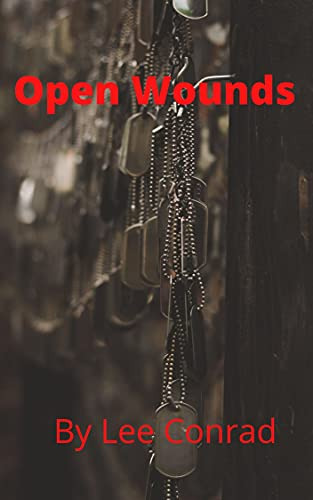
"Decades ago, there was a war in Vietnam.
Many men died and some men came home, with war plainly pasted on their face, "not back and not gone"..
Open Wounds is that story, relived through characters "Angel" and "Bobby" at every moment they were awake or asleep in nightmares.
It soon turned into reality really quick.
Dealing with pro-war people was one thing, but when Angel & Bobby tried protesting the war with a group of like minded people
and it became the only way they could tell their hometown people the truth…that was another thing entirely.
Lee Conrad delivers a close up vivid look and feel of that 1971 time period with the intensity that bristles with every word.
The stories of Vietnam veterans are numerous, and after 47 years from a near decade end of that war, it still resonates and painfully reverberates against the inside of the souls of the men who came back from there. Many of those are indeed, open wounds.
This is a read that you'll not want to put down until the end.
It's worth every minute." ~~R F : Open Wounds
3 notes
·
View notes
Text
The Short Story Reader #79 - Luckily the Account Representative Knew CPR by David Foster Wallace
Despite owning a doorstopper copy of Infinite Jest for more than a year now, this short story by David Foster Wallace is the very first time I’ve read the celebrated writer’s fiction. Reading his essays was a transformative experience; to pick up his fiction is at once exhilarating and daunting. Luckily, “Luckily the Account Representative Knew CPR” more than measured up to my expectations.
Like…
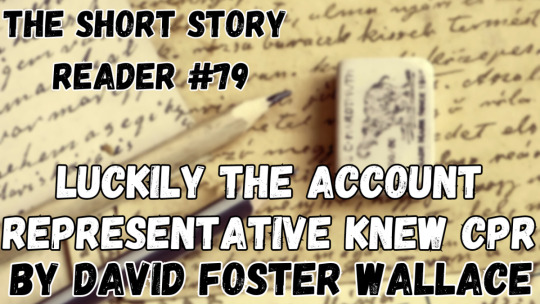
View On WordPress
#book blog#criticism#David Foster Wallace#fiction#Girl with Curious Hair#literary fiction#literature#Luckily the Account Representative Knew CPR#short story review#writer#Writing
2 notes
·
View notes